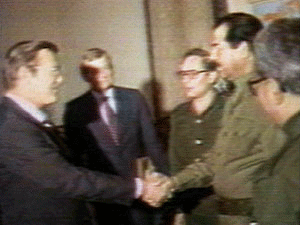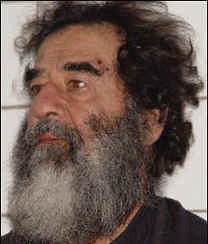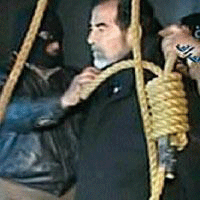January 4, 2007 Becoming an ally of the U.S. was the biggest mistake Saddam Hussein ever made. At 6 a.m. on Dec. 30, that mistake cost him his life. To nobody’s surprise, George Bush—“il capo stupido” of the zionist crime syndicate occupying the White House—said Hussein received a fair trial and that his execution was “an important milestone on Iraq’s course to becoming a democracy that can govern, sustain and defend itself.” Of course, this is the same man who said “God” told him to attack Hussein, which means we must treat the very idea of “Iraqi democracy” with the same healthy contempt we treat “Israeli democracy.” “Iraq” in any honest sense of the word, no longer exists. It was systematically destroyed by Isramerica and its sycophants after the 1991 Gulf War. What remains toady is a bleeding, terrorized occupied land. The government may be in Baghdad, but the governing power is the U.S. Embassy fortress, which means there was—and is—no Iraqi authority with the legitimacy or competence to put Hussein on trial. In fact, there wasn’t a trial. There was a predetermined verdict (guilty) and sentence (death by hanging), and a drawn out U.S.-driven charade to bring about the desired result. In any decent, lawful, democratic state, Hussein would not have been executed, and his lawyers would be filing an appeal for a new trial on the grounds of malicious prosecution and judicial bias. The fact that such an appeal would succeed doubtless had something to with the indecent, undignified haste with which he was put to death. In plain language, Hussein wasn’t executed; he was lynched. Halabja Implied in this charge is that the Kurds, who are hostile to Arab rule, were the intended target and that the attack therefore constituted a war crime. Fact is, Hussein was not responsible. As I wrote in my book The Host and the Parasite—How Israel’s Fifth Column Consumed America: “Stephen C. Pelletière, the CIA's senior political analyst on Iraq during the Iran/Iraq war showed that the gas that killed the Kurds came from Iran. He said the Kurds died, not deliberately, but as the result of a chemical-weapons battle around Halabja. “According to a tightly controlled United States Defense Intelligence Agency classified report, Pelletière said each side used gas, but the bodies of the Kurds showed that they had been killed by a blood agent, a cyanide-based gas, which Iran had used. The Iraqis, who are thought to have used mustard gas, were not known to have possessed blood agents at the time.” Moreover, even if Hussein were responsible, blame would also have fallen on the U.S., because it supplied him with the binary components to make the weapons. Thus, the U.S. had no moral authority to charge Hussein, since it was equally complicit.
Kuwait Given the sadism practised by U.S. and Israeli interrogators and jailers at Abu Ghraib prison, we again have the problem of a lack of moral authority to prosecute. Moreover, the allegations of Iraqi brutality must be evaluated against the background of deliberate anti-Iraq propaganda at the time. The most infamous act of disinformation concerned Iraqi soldiers throwing babies out of incubators. The tearful women that brought the charge turned out to be related to Kuwait’s ruling al-Sabah family and the entire event never happened. Regarding the Gulf War, the real blame lies with Saudi Arabia, Kuwait and Isramerica. Who could forget that famous meeting between Hussein and U.S. Ambassador April Glaspie in April 1991, during which she said the U.S looked upon Iraq’s problems with Kuwait as a purely internal Arab matter? Translation: “Go ahead and invade,” but why should Hussein want to? As I explain in my book: “Iraq emerged from its inconclusive and misbegotten war with Iran economically devastated. President Saddam Hussein desperately needed oil revenue to rebuild, but faced a major obstacle—Kuwait. First, it was depressing the world price by producing beyond OPEC quotas. Second, Hussein charged Kuwait with illegally tapping the Rumailah oil field that straddles the two countries. “Third, he wanted Kuwait to forgive its US$13 billion in war loans. Given that Iraq was now US$80 billion in debt and fought the Shi’ite Iranians single-handedly, Hussein thought his request reasonable, especially since Kuwait’s economy was strong.” An honest prosecution of Hussein on this count would therefore have to entail discussion of U.S./Saudi motives for allowing Kuwait to sabotage Hussein’s attempts to rebuild Iraq, which was the real cause of the war. These motives, discussed in Chapter 4 of my book, would lead to the rise of Osama bin Laden and the Muslim jihad against Isramerican occupation in the Middle East. The Kurds and the Shia On this score, Hussein is clearly guilty, because the effects described above cannot be denied. Nevertheless, Hussein was only able to commit this crime because the U.S. and Arab regimes allowed it to happen. They nurtured these insurrectionist groups but at the last minute decided that Hussein wasn’t so bad after all, and so abandoned them, much as Stalin abandoned Poland to Hitler. As the New York Times noted on April 11, 1991, the Kurdish and Shi’ite uprisings during the Gulf War brought the United States and its Arab allies to a common realization: “Whatever the sins of the Iraqi leader, he offered the West and the region a better hope for his country’s stability than did those who have suffered his repression.” The Trial Anyone who supports Palestine and opposes Isramerican hegemony has to be eliminated. Stringing him up from the nearest tree right after he was captured would have been the honest thing to do, since the U.S. had no intention of letting Hussein live. Honesty, though, makes Israemerica highly uncomfortable, and so his lynching had to be given the patina of a democratic judicial proceeding. Under “Iraqi democracy” normal standards of judicial fairness did not apply, since the verdict was a foregone conclusion. Hence, the “trial” more closely resembled a Stalinist show trial, with all the terror and coercion that the term implies. • Hussein was a Sunni Arab and president of the Ba‘ath (Ressurection) Party; the new made-in-U.S. “Iraqi Democracy” is based on a wholesale purge of Ba‘athists and the installation of a government dominated by Ba‘athist enemies—Shi’ite Arabs and Kurds. • One of Hussein’s defence lawyers Khamis al-Obeidia was shot after being abducted from his home by men dressed as police officers. Two other defence lawyers and an investigative judge were also killed after the trial started in October 2005, one of them during the first week. London-based defence lawyer Giovanni di Stefano, said the climate of fear made it impossible for the court to reach a safe verdict. • In January 2006, the U.S. had presiding Judge Rizgar Mohammed Amin removed because he was deemed too supportive of Hussein. His fate was put into the hands of Judge Raouf Rasheen Abdel-Rahman, a Kurd who lost family in Halabja. • Hussein was repeatedly mocked by his Shi’ite guards and hanged on Saturday Dec. 30, 2006, the Sunni ‘eid al Adha, “Holy Day of the Sacrifice,” which commemorates Abraham’s willingness to sacrifice his son to God. Shi’ite Arabs celebrate ‘eid on Sunday. The timing of the lynching was clearly an insult to Sunni Arabs because Iraqi law forbids executing the condemned on a major holiday. • Iraqi prime minister Nouri Kamel al-Maliki, belongs to the religious Shi’ite Dawa (Call) Party, which Hussein outlawed in the wake of the 1979 Islamic Revolution in Iran. Members of the party had also tried to assassinate Hussein, and suffered reprisals because of it. In the end, Hussein was tried by his enemies and found guilty in the deaths of 150 Iraqis. To put that fact into perspective, a survey by Iraqi physicians and overseen by epidemiologists at Johns Hopkins University determined that the U.S. invasion and occupation has caused 655,000 “excess deaths” due to violence and disease. The Iraq Center for Research and Strategic Studies found that 90 percent of Iraqis said life was better before the U.S. imposed “democracy” on them. Sometimes you have to destroy a country to satisfy a vendetta. | |||||||||||||


